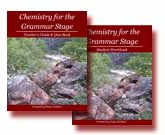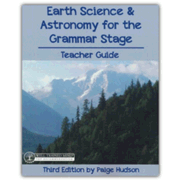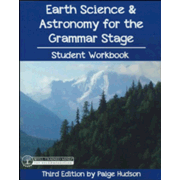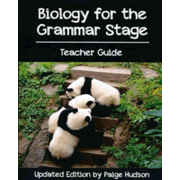My first impression of Elemental Science's Classic series (ESC) for grades one through eight was that it is very similar to Noeo Science which was already one of my Top Picks. I expected to like the ESC series because, like Noeo, ESC's methodology is so close to what I consider the ideal.
The ESC series uses colorful fact books, such as books from Usborne and DK, as spines. Many ESC courses use more than one spine book such as The Kingfisher Science Encyclopedia and DK Encyclopedia of Nature, as well as some supplemental books like Marie Curie’s Search for Radium by Beverley Birch. The ESC teacher guides chart out daily lesson plans, drawing upon the spine and supplemental books for informational content.
The courses are designed with the classical trivium stages—grammar, logic, and rhetoric—in mind. The ESC series also leans somewhat toward the classical approach as described in The Well-Trained Mind (by Susan Wise Bauer) with its emphasis on written work, acquisition of facts, and testing. It has students write definitions for vocabulary words on Unit Vocabulary Sheets, write outlines or narrative summaries of their reading, write complete lab records and reports, and make timeline entries. Courses also include quizzes, reviews, and tests, although these are optional. Of course, you can adapt how much writing each student is required to do.
Courses also draw upon Charlotte Mason methodology, using narration and sketching along with the other learning activities. Students using the ESC series create a notebook for each course, but notebook creation is made easy with the separate student workbook for each course that has much of the work already done for you and your student.
Hands-on learning through science experiments is also built into the ESC series. You will need to gather resources for science experiments. Experiment instructions are found in the teacher's guides. While experiment resources required for the Classic series are not very difficult to find, you might want to purchase their experiment kits that save you the trouble of hunting down items like aquarium tubing, large suction cups, and an instant-read thermometer used for Biology for the Grammar Stage.
ESC courses were each written to target a span of two grade levels, but tips are included for stretching each course to suit a wider age range, often using alternative spine books and adapting the amount of writing required.
The seven courses and their targeted grade levels are:
Biology for the Grammar Stage - grades 1-2
Biology for the Logic Stage - grades 5-6
Earth Science and Astronomy for the Grammar Stage - grades 2-3
Earth Science and Astronomy for the Logic Stage - grades 6-7
Chemistry for the Grammar Stage - grades 3-4
Chemistry for the Logic Stage - grades 7-8
Physics for the Grammar Stage - grades 4-5
Each ESC course package has both a teacher guide and a student book. Teacher guides for all levels include answers keys; scheduling options for either two days or five days per week; and sections with additional suggestions for reading, internet research, activities, and experiments. Teacher guides also include discussion questions for you to use with your students and ways to expand upon the experiments.
In courses for the grammar stage, the student book is a workbook with custom-designed unit project sheets, notebooking pages, lab reports, and a glossary. The lesson pages are used primarily for recording information.
In courses for the logic stage, students are expected to be much more self-directed. So the student book includes the lesson plans along with recording pages. At this level, there are also some unlabeled drawings for students to complete. Courses for the logic stage direct students to work on a science fair project of their choice during one unit.
Optional coloring pages and lapbooking plans that coordinate with some of the courses are also available.
Elemental Science also has a course for younger learners that I just want to mention. Intro to Science (for kindergarten and first grade) is similar in approach to courses for older students although it uses much more discussion, drawing, coloring, “science play,” and much less writing than do the upper-grade levels. Brief teaching information is included in the teacher guide. You will also use The Handbook of Nature Study (Comstock Publishing) and experiments from More Mudpies and Magnets (Gryphon House) as well as additional library books. You could easily use this course with students up through second grade for introductory science.
The program is presented from a secular perspective. While there is no direct teaching on evolution or religious beliefs in either the teacher guides or student books (aside from an optional lesson on the big bang in Earth Science and Astronomy for the Logic Level), the required resources reflect evolutionary assumptions. You can read more about their perspective on Elemental Science’s FAQ page.

















